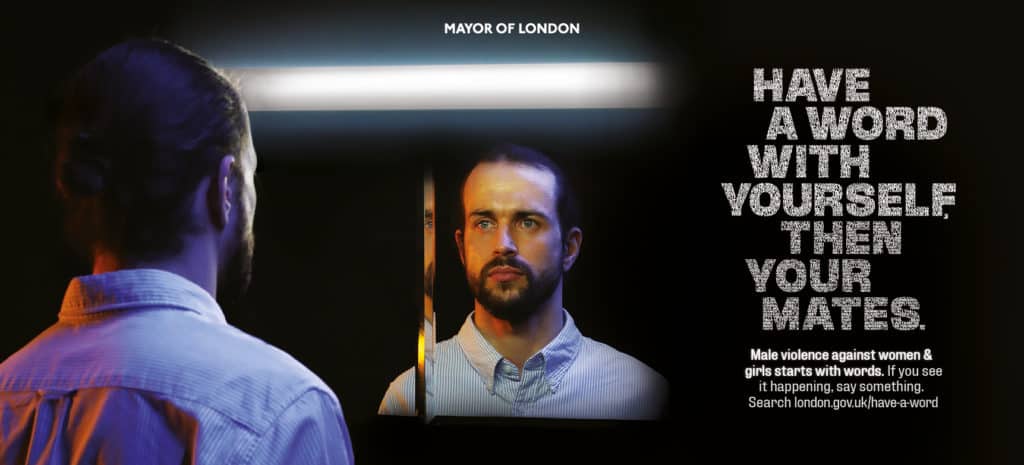The recent cases of Sarah Everard and Sabina Nessa have highlighted the issue of violence against women and girls in London. All too often the focus has been placed on women’s behaviour and how to keep themselves safe but the new Have a Word with Yourself, then Your Mates campaign focuses on men’s behaviour and how men calling out poor behaviour when they see it is the first step to stopping violence before it starts.
“In this country – and in our city – we currently face an epidemic of violence against women and girls. In the UK, a violent man kills a woman every three days. We can change this. We need to change this. And as men, it starts by reflecting on our own behaviour and the way we see, treat and talk about women. We all have a responsibility to raise our voices to help keep women and girls safe.”
London Mayor, Sidiq Khan
The statistics around abuse are startling:
- Lewisham has one of the highest rates of domestic abuse in London.
- Older people, LGBTQ+ people, Black, Asian and minority ethnic communities, refugees, and adults with care and support needs can be at higher risk.
- An estimated 7.3% of women (1.6 million) and 3.6% of men (757,000) experienced domestic abuse in the year April 2019 to March 2020.
- In the year ending March 2020, women aged 16 to 19 years old were the age group most likely to be victims of domestic abuse, with 14% being a victim at least once.
- Overall, people from a ‘mixed’ ethnic background are more likely to experience domestic abuse. For the year ending March 2020, those in the ‘mixed’ ethnic group were significantly more likely to experience domestic abuse (7.6%) than those of White (5.7%), Black (3.7%) or Asian (3.6%) background.
- Domestic abuse costs the UK economy £66 billion annually, making the cost for a single victim of abuse, £34,015.
Abuse of women can take many forms, all of which can leave women afraid whilst out and about in groups but especially when out alone. Catcalling, unwanted touching or inappropriate talking, stalking and upskirting are all forms of abuse and many men are unaware of how these affect women and are all too often brushed off as “banter”. Tackling this type of abuse can make women safer wherever they are.
Behavioural science shows that people are most likely to listen to their peers – people they know, trust, and relate to. That’s why it is important for men to talk about this abusive behaviour within their friends, so that it can be called out in a way that is educational and encourages a change in attitudes.
It’s important that care is taken when calling out abusive behaviour, to ensure this happens in a way that is safe for everyone involved. If you feel you would be putting yourself in danger by calling out a situation, you should not do so, and there are other ways you can show that you don’t support this behaviour.
Below are some tips to call out harmful behaviour without humiliating or shaming, or escalating the situation:
- Don’t feel pressured to laugh along to sexist conversations or ‘banter’
- Change the subject
- Find an opportunity to talk about it with the person away from other people
- Walk away, don’t engage with the inappropriate comments or conversation
- Get used to saying ‘that’s not okay’ when you hear sexist jokes from friends, family and colleagues
- Ask curious questions like ‘what do you mean by that?’ or ‘what makes you think that?’
There is advice available on the Mens Minds Matter website around how to deal with anger which leads to violence and aggression towards others.
It can be difficult to call out bad behaviour in your friendship groups, at work or when socialising. Here’s a few examples of some common sexist phrases that you may hear, that you can challenge with your peers, sons, work colleagues or talk to the men in your life about:
“Boys will be boys.”
Nothing about misogyny is inevitable. Suggesting that sexist behaviour from men and boys is natural serves no one and harms everyone, regardless of gender. We shouldn’t excuse or normalise it. Boys and men are capable of change—we must end this toxic culture and treat girls and women with respect.
“She’s asking for it dressed like that.”
Too often, women and girls are blamed for the sexual assault and crimes committed against them. Everything from the clothes they wear, to the fact that they are out at night time is scrutinised. Let’s be clear: the only person responsible for sexual assault is the perpetrator. Don’t play into this culture of victim blaming. Call it out.
“My ex-girlfriend is crazy.”
Saying a woman is “crazy” is a way of discrediting them and undermining their reactions or feelings. It can also be a form of controlling behaviour because it questions someone’s reality and influences others into perceiving them as unreliable or unreasonable. Let’s leave this tired stereotype behind.
“She’s such a drama queen.”
Calling a woman “dramatic” is highly stigmatising. Men who express emotion, frustration or voice their concerns are unlikely to face the same criticism. We need to end these double standards.
For more information



